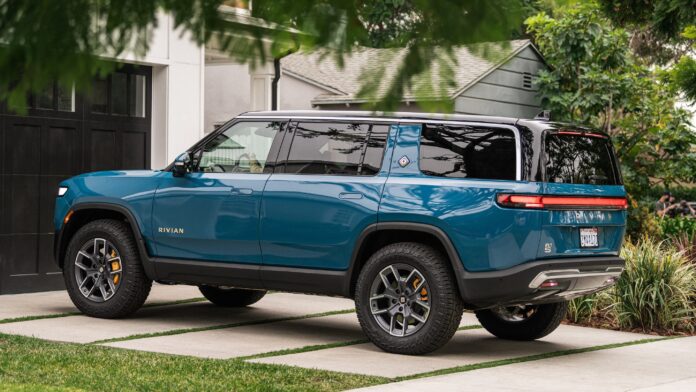Rivian is producing more of its futuristic-looking, emissions-free cars than ever these days; 7,363 vehicles(Opens in a new window) came off the line of its Illinois plant in Q3, more than any previous quarter since production began in late 2021, while 6,584 were delivered to customers across the country.
A court ruling regarding a Rivian plant in Georgia, however, may derail some of that progress.
CEO RJ Scaringe has promised to produce 25,000 vehicles in 2022, following a disappointing 2021 that saw only 1,015 vehicles produced and 920 delivered to customers, according to a somber Q4 2021 shareholder letter(Opens in a new window). Rivian is now closing in on that goal as supply chain woes clear up. It produced 2,553 vehicles(Opens in a new window) in Q1 2022, 4,401 vehicles(Opens in a new window) in Q2, and now 7,363 vehicles in Q3. The automaker has to crank out 10,683 in Q4 to hit its target.
2022 Rivian R1T pickup truck
(Credit: Rivian)
The numbers do not include a breakdown between Rivian’s two models: the R1T pickup truck and R1S SUV. Both start around $75,000 but can easily climb to over $100,000 after customers choose(Opens in a new window) the battery pack, interior/exterior, wheel type, and extra accessories.
Rivian is looking to ramp up production with the help of a second, $5 billion factory in Georgia. But the future of that facility is now in question after Chief Judge Brenda Holbert Trammell of the Ocmulgee Superior Courts ruled against the $1.5 billion in tax incentives the state previously offered Rivian to build the factory, The Verge reports(Opens in a new window).
A Rivian R1T pickup truck coming down the line in a highly automated factory in Illinois.
(Credit: Rivian)
The high-tech facility is expected to produce 400,000 emissions-free vehicles a year and employ 7,500 workers at an average annual salary of $56,000, but Trammell is skeptical(Opens in a new window).
“The only guaranteed salary is $36,400 per year, not the $56,000 referenced,” her ruling reads. She also cited concerns about Rivian’s limited production track record, financial losses, and uncertainties regarding its ability to compete in the “highly competitive” auto industry. (Other EV startups have struggled, such as Electric Mile Solutions, which declared bankruptcy(Opens in a new window) in June.)
A Rocky Start
Initially, the idea of a new, all-electric car company peaked the interest of Tesla-minded investors. Rivian’s November 2021 IPO saw $78/share–the largest for the year at the time, Bloomberg reported(Opens in a new window). A Ford investment(Opens in a new window) and an order of 100,000 customized delivery vans from Amazon upped the company’s prospects even further.
Rivian custom designed the vehicles for Amazon.
(Credit: Amazon)
But supply chain woes made it difficult to deliver. Car components, notably microchips, experienced a global shortage across the auto industry early in the pandemic, and inflation exacerbated the issue. It took longer to get parts, and when Rivian could finally place an order, prices were higher(Opens in a new window).
Recommended by Our Editors
In July, Rivian laid off(Opens in a new window) 6% of it workforce and raised prices for certain configurations by $12,000 to $20,000, Electrek reported(Opens in a new window), causing some customers who had already paid a $1,000 deposit to cancel their orders entirely.
A Rivian truck projected onto a New York City skyscraper during the company’s November 2021 IPO day.
(Credit: Rivian.)
In the meantime, Ford’s F-150 Lightning electric pickup truck, which is half the price, launched in April and logged 200,000 customer reservations.
Rivian has been slowly rebuilding. In its Q2 earnings report, Scaringe said(Opens in a new window) it still had a growing backlog of almost 100,000 reservations. To manage expectations, the company changed its vehicle reservation system so customers couldn’t lock in a specific configuration until their production slot was ready.
Under the new reservation system, customers can browse options in the Vehicle Studio, but can only lock in preferences closer to production.
(Credit: Rivian.com)
Rivian’s nationwide “Adventure Network” of proprietary chargers has also began rolling out this quarter in California and Colorado.
Get Our Best Stories!
Sign up for What’s New Now to get our top stories delivered to your inbox every morning.
This newsletter may contain advertising, deals, or affiliate links. Subscribing to a newsletter indicates your consent to our Terms of Use and Privacy Policy. You may unsubscribe from the newsletters at any time.
Hits: 0


















